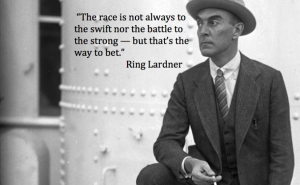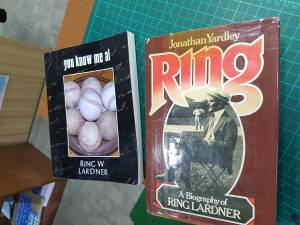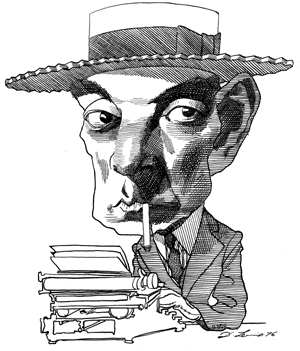During my unsuccessful year-long drive to convince the College Football Hall of Fame to admit Abner Haynes, I joined the Football Writers Association of America. I did so just to have access to its membership directory. Approximately 1,100 e-mails were sent out on behalf of North Texas’ illustrious No. 28. One person who responded and offered support was Rex Lardner, Jr. of Tucson. His family name was unusual enough to  prompt a question—was he by chance related to Ring Lardner, the famous sports writer of the early 20th century? Indeed he was, a great nephew to be specific.
prompt a question—was he by chance related to Ring Lardner, the famous sports writer of the early 20th century? Indeed he was, a great nephew to be specific.
Lardner is less remembered than two of his contemporaries, Damon Runyan and Grantland Rice. Not to be critical of those gentlemen, but Lardner was probably a better wordsmith. His writing style was crisp and sardonic, and he was among the first to talk about jocks in a vernacular way. He was definitely not a gee-whizzer. Born in Niles, Michigan, Lardner (1885−1933) wrote for the South Bend Times, the Chicago Examiner and the Chicago Tribune, and had his work printed in another 150 newspapers via syndication. He covered boxing, horse racing, football—he loved the Fighting Irish of Notre Dame—, yachting, golf and most of all baseball. Lardner  helped break the story on the 1919 Black Sox scandal. He rubbed shoulders with F. Scott Fitzgerald, Maxwell Perkins, Ernest Hemingway, George S. Kaufman and, of course, baseball stars like Babe Ruth, Ty Cobb and Christy Matthewson. In my view, Lardner’s crowning achievement was his novel You Know Me Al. In it, a bush league player named Jack Keefe writes letters to his friend Al Blanchard back home in Indiana. Keefe, an uneducated rube, is vain, egotistical and self-absorbed, often telling Al how he had been tempted to “bust the jaw” of a teammate, opponent, manager, fan—or sports writer. I read it, along with Jonathan Yardley’s biography, in 2013.
helped break the story on the 1919 Black Sox scandal. He rubbed shoulders with F. Scott Fitzgerald, Maxwell Perkins, Ernest Hemingway, George S. Kaufman and, of course, baseball stars like Babe Ruth, Ty Cobb and Christy Matthewson. In my view, Lardner’s crowning achievement was his novel You Know Me Al. In it, a bush league player named Jack Keefe writes letters to his friend Al Blanchard back home in Indiana. Keefe, an uneducated rube, is vain, egotistical and self-absorbed, often telling Al how he had been tempted to “bust the jaw” of a teammate, opponent, manager, fan—or sports writer. I read it, along with Jonathan Yardley’s biography, in 2013.
Admired by William Faulkner, Virginia Woolf and H.L. Mencken, Lardner also wrote Broadway plays, music and poetry, but with far less success. He only lived 48 years, his death by heart attack and tuberculosis possibly hastened by years of heavy drinking. Too bad, because he would have been proud of his descendants, some of whom are listed below.
- Son John (1912−1960) was a literary wit, too. The writer of sports columns for Newsweek, The New Yorker and the Saturday Evening Post among others, he was every bit the equal of Red Smith and Jimmy Cannon. How good was he? Roger Kahn compiled his selected works in The World of John Lardner (1961) and John Schulian did much the same in The John Lardner Reader: A Press Box Legend’s Classic Sportswriting (2010).
- James Lardner (1914−1938) attended Harvard for two years, dropped out and joined the Abraham Lincoln Brigade in the Spanish Civil War. He sustained shrapnel injuries, returned to battle and died in action.
- Ring Lardner, Jr. (1915−2000) graduated from Princeton, went to Hollywood and became an Academy Award-winning script writer. An avowed leftist, he supported his brother’s fight against Franco in Spain and joined the Communist Party. After World War II, the House Un-American Activities Committee started investigating the movie industry. Lardner and nine others were called before Congress but refused to answer any questions—as was their Constitutional right. An unofficial blacklist was not lifted until the mid-1960s.
- Rex Lardner (1918−1998), the great man’s nephew and father of the aforementioned Rex, Jr., was a World War II vet. He wrote for many national publications and was a colleague of Ernie Kovacs, television’s first video artist. He penned 15 books, mostly about tennis.
- David Lardner (1919−1944), the most gregarious of Lardner’s four sons, was writing opinionated columns in The New Yorker at age 20. He did not fight in World War II but was a reporter and correspondent. Less than a month after arriving in Europe, he died when the Jeep in which he was riding ran over a mine in Aachen, Germany.
- His great-nephew, George Lardner, Jr., is an associate at the Center for the Study of the Presidency. He joined the staff of the Washington Post in 1963, covering Congress and the White House, the CIA, the FBI, Mafia trials and political assassinations. In 1993, he won a Pulitzer Prize for investigative journalism; sadly, the issue was the murder of his daughter, Kristin, by a deranged ex-boyfriend.
- Ann Lardner Waswo, his granddaughter, is on the faculty at Oxford University. She has written academic books about Japan.
- Another granddaughter, Kate Lardner, is best known for Shut Up, He Explained: A Memoir of Growing Up on the Blacklist.
- James Lardner, a grandson, is the author of many books including NYPD: A City and Its Police and Fast Forward: Hollywood, the Japanese and the VCR Wars.
- And what of Rex, Jr.? Unlike the paterfamilias and most of those referenced above, he is not a writer. But he, brother Mike and sister Lonnie have had successful careers in television.


1 Comment
Richard:
What a family tree. Quite impressive.
I hadn’t heard of this man or his family, but how neat to have meet the family as it were through the Abner project. Very neat and informative.
Add Comment